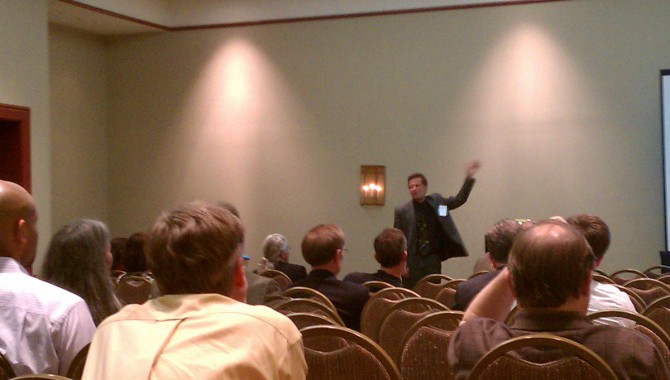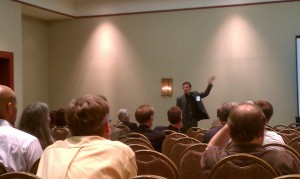
Arthur Chmielewski presenting on the psychological impacts on estimation and assessment at the 2012 NASA PM Challenge. Photo Credit: NASA APPEL
February 29, 2012 Vol. 5, Issue 2
How does human psychology affect our ability to estimate?

Arthur Chmielewski presenting on the psychological impacts on estimation and assessment at the 2012 NASA PM Challenge.
Photo Credit: NASA APPEL
Pharaoh Snefrus engineers were possibly the first group of humans in recorded history to register a really bad estimate, said Arthur Chmielewski, project manager at the Jet Propulsion Laboratory (JPL). Their schedule ran over by 600 percent. He named other examples: the Hubble Space Telescope (800% overrun), the Chunnel (220% overrun), the Walt Disney Concert Hall (258% overrun), and the Sydney Opera House (1400% overrun). Popular reasons for overruns include changes in scope, poor communication, technical issues, new technology, and acts of god, Chmielewski explained. Are these really the main culprits for overruns? he asked.
Theres something going on when we fill out the first Excel cell of a project spreadsheet, said Chmielewski. Fascinated by his own estimation practices for cost and schedule throughout his career, Chmielewski decided to conduct a small study. With the assistance of an intern, Chmielewski addressed five psychological effects that shape our ability to estimate:
- Decomposition breaking up a larger estimate into smaller parts.
- Reserve Fallacy dependence on unfounded reserve levels.
- Optimism overly optimistic assumptions in planning.
- Anchoring Bias relying too heavily on one trait or piece of information when making a decision.
- Question and Answer Mismatch the intention of the question is not addressed by the answer.
The experiment was conducted on 507 volunteers, consisting of Chmielewski’s NASA colleagues, college students, and academic friends. He sent each participant an image of a kitchen sink with a smattering of dishes in need of cleaning. The study asked variations of the question How long will it take to clean this kitchen? For instance, asking How long will it take you to clean this kitchen 50 percent of the time addressed the question-and-answer mismatch effect, whereas asking Best case scenario, nothing goes wrong, how long will it take you to clean this kitchen? addressed the optimism effect.
Based on his findings, he offered the following recommendations: don’t anchor; be precise when you ask your questions; don’t use common language for costing questions; don’t expect deep decomposition to improve accuracy; calculate the budget reserve base on risk; and combat optimism by base-lining historical and likely risks.
It is very difficult to recover from poor estimates, said Chmielewski. Understanding how human psychology influences this is critical to achieving realistic estimates and increasing the likelihood of project success.






